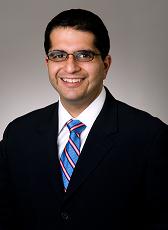 Board-certified gastroenterologist Neville Bamji, MD, currently practices at The Mount Sinai Medical Center in New York City. Here Dr. Bamji discusses colorectal cancer screening, current issues in GI cancer and his approach to patient care.
Board-certified gastroenterologist Neville Bamji, MD, currently practices at The Mount Sinai Medical Center in New York City. Here Dr. Bamji discusses colorectal cancer screening, current issues in GI cancer and his approach to patient care. Q: What is currently the most important issue in GI cancer?
Dr. Neville Bamji: The most important message is that colon cancer can be prevented As GI physicians, one of our main responsibilities is to diagnose colon cancer during colonoscopy. A recent study conducted by the Centers for Disease Control and Prevention found that there are 23 million Americans that have not been screened for colon cancer that could have been. Colorectal cancer is second only to lung cancer as a cause of cancer death in the United States. It is surprising after all the work done in prevention that colorectal cancer remains so prevalent.
Q: Why do you think the lack of screening is still an issue?
NB: There just isn't enough awareness. Some people may not believe in getting screened if they feel well. Two out of three people that go untested have physicians and access to testing. They just don't get it done. In regards to colonoscopy, many patients think it will be painful and invasive. Many times after a colonoscopy patients remark on how easy and painless the procedure was.
There are also economic barriers, even if a patient has insurance. Patients have to take time off of from work and arrange for someone to pick them up from the procedure. These can be big deterrents.
Q: Is colonoscopy still the best answer to colon cancer prevention?
NB: It does save lives and has been proven to reduce the incidence of colorectal cancer. But, the best test is the test that gets done. There are options, whether patients choose colonoscopy, sigmoidoscopy, or a fecal occult stool test, they just need to get it done.
Q: Where do you see the future of technology of GI cancer diagnosis headed?
NB: I think our technology is pretty great right now.. We have unbelievable, high definition imaging that allows us to see In the future, we may see tests such fecal DNA testing come into widespread practice.
Q: How can gastroenterologists approach patient care in GI cancer cases?
NB: It can be challenging. Each patient diagnosed with cancer requires an individualized approach and build a team of physicians around the patient. Coordinate with oncologists and surgeons who can really explain the condition and all of the available treatment options with each patient. Take the time to carefully explain everything and set clear expectations.
Cancer has a stigma associated with it. When a patient hears the word cancer, there are a lot of immediate concerns. It is important to be compassionate and communicate throughout the course of care, GI physicians should maintain a strong relationship with the patient guide them through the process.
More Articles on Gastroenterology:
Why Colonoscopy is Necessary: 3 Gastroenterologists Speak Up
Fecal Microbiota Transplant & the Future of C. diff Treatment: Q&A With Dr. William Katkov of Saint John's Health Center
EndoChoice Fuse Gastroscope Receives FDA 510(k) Clearance


